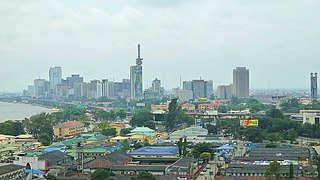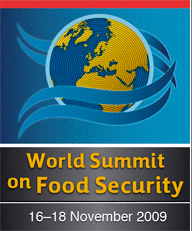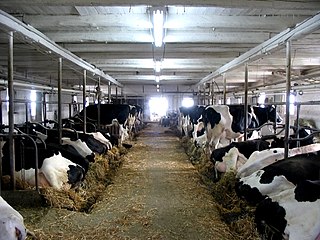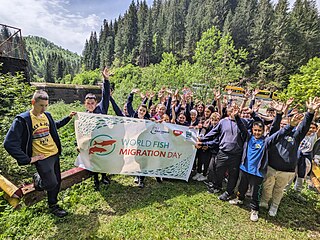
The Food and Agriculture Organization of the United Nations (FAO) is a specialized agency of the United Nations that leads international efforts to defeat hunger and improve nutrition and food security. Its Latin motto, fiat panis, translates to "let there be bread". It was founded on 16 October 1945.

The economy of Nigeria is a middle-income, mixed economy and emerging market with expanding manufacturing, financial, service, communications, technology, and entertainment sectors. It is ranked as the 53rd-largest economy in the world in terms of nominal GDP, the fourth largest in Africa and the 27th-largest in terms of purchasing power parity.

World Water Day is an annual United Nations (UN) observance day held on the 22nd of March that highlights the importance of fresh water. The day is used to advocate for the sustainable management of freshwater resources. The theme of each year focuses on topics relevant to clean water, sanitation and hygiene (WASH), which is in line with the targets of Sustainable Development Goal 6. The UN World Water Development Report (WWDR) is released each year around World Water Day.

World Environment Day (WED) is celebrated annually on 5 June and encourages awareness and action for the protection of the environment. It is supported by many non-governmental organizations, businesses, government entities, and represents the primary United Nations outreach day supporting the environment.

World Food Day is an international day celebrated every year worldwide on October 16 to commemorate the date of the founding of the United Nations Food and Agriculture Organization in 1945. The day is celebrated widely by many other organizations concerned with hunger and food security, including the World Food Programme, the World Health Organization and the International Fund for Agricultural Development. WFP received the Nobel Prize in Peace for 2020 for their efforts to combat hunger, contribute to peace in conflict areas, and for playing a leading role in stopping the use of hunger in the form of a weapon for war and conflict.

Environmental vegetarianism is the practice of vegetarianism that is motivated by the desire to create a sustainable diet, which avoids the negative environmental impact of meat production. Livestock as a whole is estimated to be responsible for around 15% of global greenhouse gas emissions. As a result, significant reduction in meat consumption has been advocated by, among others, the Intergovernmental Panel on Climate Change in their 2019 special report and as part of the 2017 World Scientists' Warning to Humanity.
Food fortification is the addition of micronutrients to food products. Food enrichment specifically means adding back nutrients lost during food processing, while fortification includes adding nutrients not naturally present. Food manufacturers and governments have used these practices since the 1920s to help prevent nutrient deficiencies in populations. Common nutrient deficiencies in a region often result from local soil conditions or limitations of staple foods. The addition of micronutrients to staples and condiments can prevent large-scale deficiency diseases in these cases.

The year 2011 was declared the International Year of Forests by the United Nations to raise awareness and strengthen the sustainable management, conservation and sustainable development of all types of forests for the benefit of current and future generations.

Many farmers in India depend on animal husbandry for their livelihood. In addition to supplying milk, meat, eggs, wool, their castings (dung) and hides, animals, mainly bullocks, are the major source of power for both farmers and dairies. Thus, animal husbandry plays an important role in the rural economy. The gross value of output from this sector was 8,123 billion Rupees in FY 2015–16.

Agriculture is considered the backbone of Pakistan's economy, which relies heavily on its major crops. Pakistan's principal natural resources are arable land and water. Agriculture accounts for about 18.9% of Pakistan's GDP and employs about 42.3% of the labour force. The most agricultural province is Punjab where wheat & cotton are the most grown. Mango orchards are mostly found in Sindh and Punjab provinces, making it the world's fourth largest producer of mangoes.

The World Summit on Food Security took place in Rome, Italy between 16 and 18 November 2009. The decision to convene the summit was taken by the Council of the Food and Agriculture Organization of the United Nations (FAO) in June 2009, at the proposal of FAO Director-General Dr Jacques Diouf. Sixty Heads of State and Government and 192 ministers, from 182 countries and the European Community, attended the summit, which took place at FAO's headquarters.

Groupe Lactalis S.A. is a French multinational dairy products corporation, owned by the Besnier family and based in Laval, Mayenne, France. The company's former name was Besnier S.A.

The International Day of Forests was established on the 21st day of March, by resolution of the United Nations General Assembly on November 28, 2013. Each year, various events celebrate and raise awareness of the importance of all types of forests, and trees outside forests, for the benefit of current and future generations. Countries are encouraged to undertake efforts to organize local, national, and international activities involving forests and trees, such as tree planting campaigns, on International Day of Forests. The Secretariat of the United Nations Forum on Forests, in collaboration with the Food and Agriculture Organization, facilitates the implementation of such events in collaboration with governments, the Collaborative Partnership on Forests, and international, regional and subregional organizations. International Day of Forests was observed for the first time on March 21, 2013.

Canada's supply management, abbreviated SM, is a national agricultural policy framework used across the country, which controls the supply of dairy, poultry and eggs through production and import controls and pricing mechanisms. The supply management system was authorized by the 1972 Farm Products Agencies Act, which established the two national agencies that oversee the system. The Agriculture and Agri-Food Canada federal department is responsible for both the Canadian Dairy Commission and its analogue for eggs, chicken and turkey products, the Farm Products Council of Canada. Five national supply management organizations, the SM-5 Organizations — Egg Farmers of Canada (EFC), Turkey Farmers of Canada (TFC), Chicken Farmers of Canada (CFC), the Canadian Hatching Egg Producers (CHEP) and the Ottawa-based Canadian Dairy Commission (CDC), a Crown corporation — in collaboration with provincial and national governing agencies, organizations and committees, administer the supply management system.
The International Year of Soils, 2015 was declared by the Sixty-eighth session of the United Nations General Assembly on December 20, 2013, after recognizing December 5 as World Soil Day.

World Fish Migration Day (WFMD) is a global event celebrated every two years to raise global attention to the need for restored river connections for migrating fish. Restored river connectivity allows the achievement of healthier fish stocks and more productive rivers. The 6th World Fish Migration Day was celebrated on May 25, 2024, under the theme “Free Flow”.
The dairy processing industry in Uganda is young, rapidly growing, and vibrant.
Food prices refer to the average price level for food across countries, regions and on a global scale. Food prices affect producers and consumers of food. Price levels depend on the food production process, including food marketing and food distribution. Fluctuation in food prices is determined by a number of compounding factors. Geopolitical events, global demand, exchange rates, government policy, diseases and crop yield, energy costs, availability of natural resources for agriculture, food speculation, changes in the use of soil and weather events directly affect food prices. To a certain extent, adverse price trends can be counteracted by food politics.

Global Goals Week is a shared commitment between a coalition of over 160 partners across all industries, which mobilizes annually in September to bring together communities, demand urgency, and supercharge solutions for the Sustainable Development Goals (SDGs). It was founded in 2016 by the United Nations Foundation, Project Everyone, and the United Nations Development Programme (UNDP). It is timed to coincide with the UN General Assembly "High-Level Week" in New York. The week includes events, summits, conferences, forums, workshops, pledges, and other activations in New York, around the world, and online. It usually runs alongside Climate Week NYC, the annual conference of Goalkeepers, Bloomberg Global Business Forum and many other high-level events.

Agriculture in Ireland began during the neolithic era, when inhabitants of the island began to practice animal husbandry and farming grains. Principal crops grown during the neolithic era included barley and wheat.

















